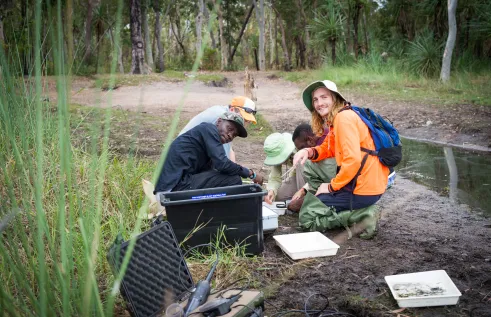Key details
Duration
Locations
Entry requirements
View full entry requirementsCredit points required
160Course code
Overview
Environmental science and environmental management at Charles Darwin University are research-intensive, dynamic disciplines, situated within some of the most spectacular and fascinating natural and cultural environments in Australia.
The Master of Environmental Management provides postgraduate education for existing and future professionals on the context, principles and practices for environmental management, particularly in the wet-dry and semi-arid tropical ecosystems and arid landscapes. The skills, concepts and applications covered in this course are also highly transferable to other ecosystems.
The core units focus on the social context within which environmental management takes place. The flexibility of specialist electives means you can undertake the course fully online or on campus, or a by a combination of both, depending on unit selection. Small class sizes mean that all students have ready access to staff, via collegial online or face-to-face interactions.
The course covers both the knowledge and technical skills for natural resource management within its social context and is responsive to the changing needs of employers and other stakeholders, incorporating the latest outcomes of regional research. Graduates of this course may seek employment in areas of research or environmental and natural resources management, within regional natural resource management agencies, environmental NGOs, Indigenous natural resources management organisations, consultancy firms and the resources sector.
Career opportunities
Graduating from this course may lead to a career in areas of research or environmental and natural resources management, within regional agencies and departments, environmental NGOs, Indigenous natural resources management organisations, consultancy firms and the resources sector. Some graduates continue into a PhD program.
Professional recognition
Graduates may seek professional membership to associations such as the Australian Rangelands Society, Ecological Society of Australia and Environment Institute of Australia and New Zealand.
Credit transfers and advanced standing
Pathways
Pathways for Higher Education to Higher Education
For information about credit transfer available to students with complete or incomplete study at this or other Institutions refer to Pathways for Higher Education to Higher Education
Credit transfer
For further information on credit transfer and how to apply visit ASK CDU
Credit transfers and advanced standing
Credit transfer
For further information on credit transfer and how to apply visit ASK CDU
Fees
Both Commonwealth supported (CS) and full fee (FF) places are available for this course. If you would like to apply for a CS place use the SATAC code 1CM089. If you would like to apply for a FF place you will need to use the SATAC code 1CM589.
Commonwealth supported places
Commonwealth Supported places are available in this course to students who meet one of the following residency requirements:
(a) be an Australian citizen, who will complete some of your course of study while resident in Australia; or
(b) a New Zealand citizen; or an Australian permanent visa holder; or an eligible former permanent humanitarian visa holder; who studies the entire course while living in Australia.
Further information about fees and charges can be found at Fees and Payments.
Non-Commonwealth supported places
Full fee paying places are available in this course.
Information about fees and charges can be found at Fees and Payments.
International tuition fees
The annual tuition fee for full time study in 2026 is AUD $37,224.00. This equates to $4,653.00 per 10 credit point unit (0.125 EFTSL).
These fees are subject to increases annually, effective at the start of each calendar year.
You can find a list of International fees and payments you can expect to pay as part of your studies in Australia. See 2026 Higher Education International Annual Tuition Fees.
CDU offers a number of scholarships to international students to assist with the cost of study.

Why study science or the environment at CDU?
Interested in solving our planet's biggest environmental issues? There's never been a better time to study a postgraduate degree in science, environmental science and management with CDU. Gain advanced skills and knowledge that help progress your career. Apply critical thinking to future-focused solutions across real-world problems.
- #2 Australian university for postgraduate employment outcomes (GUG 2024)
- Choose to study online, on campus, part-time or full-time as it suits you

Why study science or the environment at CDU?
If you're interested in finding solutions to our planet's environmental issues, there's never been a better time to study science, environmental science and management at CDU. You'll be prepared to apply the academic theories and principles you learn in class to real-world problems in a diverse range of careers.
- #2 Australian university for postgraduate employment outcomes (GUG 2024)

Why study science or the environment at CDU?
Interested in solving our planet's biggest environmental issues? There's never been a better time to study a postgraduate degree in science, environmental science and management with CDU. Gain advanced skills and knowledge that help progress your career. Apply critical thinking to future-focused solutions across real-world problems.
- #2 Australian university for postgraduate employment outcomes (GUG 2024)
- Choose to study online, on campus, part-time or full-time as it suits you

Why study science or the environment at CDU?
If you're interested in finding solutions to our planet's environmental issues, there's never been a better time to study science, environmental science and management at CDU. You'll be prepared to apply the academic theories and principles you learn in class to real-world problems in a diverse range of careers.
- #2 Australian university for postgraduate employment outcomes (GUG 2024)
What will I study?
The course structure consists of core and specialist elective units, electives and a research project. The program offers an exciting range of opportunities to develop field, technical and practical skills, as well as master-level skills in scholarship and research application.
Course structure
Core units are Ecology and Management of Tropical Forests and Savannas, Environmental Planning and Policy and Community Engagement for Biosecurity and Natural Resources Management. These units set the framework for the course as a whole. All SENVM1 students are required to complete at last one statistics or research design unit (Specialist Elective A) that builds on your existing skills - this can be chosen from an advanced or introductory level. Specialist Electives B are chosen from among units listed under clusters headings in: Livelihoods, Natural Resources Management or Spatial Science. Specialist Elective units have been chosen to complement the content knowledge, conceptual understanding and skills developed in the Core units.
Units including fieldwork may be taken (by students able to attend the relevant field location), through their choice of units. This ensures that students gain first-hand knowledge of biologically rich and diverse tropical ecosystems and meet senior professionals active in the field of environmental management as well as CDU academic staff. There is also the opportunity to undertake work integrated learning, where students include a workplace-based project in their choice of electives. Students can also choose to take intensive units with remote field locations, and there are often a range of international study opportunities available.
The final research project involves supervision by Charles Darwin University research staff, and other professionals from outside the university as appropriate. After completing the coursework component of the program each student designs, develops and implements a one semester research project, under supervision. Projects are developed in collaboration with researchers at CDU or environmental agencies, exposing students to professional practices in research and management. You may also choose a research project in your workplace.
Note: The standard course offering is 2 yrs (4 semesters of study). Applicants with a degree in a directly related discipline, studied in English, can apply to enter a 1.5 yr study plan (3 semesters of study).
While all candidates enrol into the Master program, alternative exit points are available after one semester of study (Graduate Certificate) or two semesters of study (Graduate Diploma), subject to the candidate completing the required units of study.
A candidate must successfully complete units totalling 160 credit points (cp) as detailed below. All units are valued at 10 credit points unless otherwise indicated.
| Unit type | Credit Points | Specific requirements |
| Core Units (3 units) | 30cp | Compulsory Core units totalling 30 credit points as detailed below. ENV509 Ecology and Management of Tropical Forests and Savannas ENV513 Environmental Planning and Policy ENV521 Community Engagement for Biosecurity and Natural Resource Management |
| Specialist Elective A Units (1 unit) | 10cp | Specialist Elective unit totalling 10 credit points selected from the list of units detailed below: SBI209 Design and Analysis of Biological Studies ENV311 Practical Statistics and Data Reasoning ENV511 Real-World Statistics and Data Reasoning EMG505 Research Methodologies in Education PRT564 Data Analytics and Visualisation SID510 Advanced Communication and Engagement in Science and Technology (new from 2025) |
| Specialist Elective B Units (4 - 6 units) | 40 - 60cp | Specialist Elective units totalling 40 - 60 credit points from the list of unit clusters detailed below: (these unit clusters are a guide only and do not represent formal course specialisations; any of these units can be chosen) LIVELIHOODS NATURAL RESOURCES MANAGEMENT SPATIAL SCIENCE PROFESSIONAL PRACTICE/FIELD INTENSIVES |
| Elective Units (4 units) | 40cp | Elective units totalling 40 credit points Elective units may be selected from available postgraduate units on offer at the University including: Specialist A and B units not already completed, or units from other Masters courses at CDU or elsewhere. Students are encouraged to seek advice from the course coordinator on unit selection. |
| Research/Placement Units (1 - 2 units) | 20 - 40cp | Research or Placement Pathway units totalling 20 - 40 credit points as detailed below: After completing a minimum of 120 credit points of coursework, students are offered two pathways to complete the course. Each student will choose one pathway. Pathway 1: Research (40cp) OR Pathway 2: Professional Experience Capstone (20cp) |
| 160cp | Total Credit Points |
Course Rules (unless otherwise indicated in the above course structure)
- See the Higher Education Course Rules (Award Requirements) in the Units and Courses Policy.
COURSE CHANGES AND TRANSITIONAL ARRANGEMENTS - 2026
Two pathway options to be introduced in 2026:
- Research option (Pathway 1)
- ENV821 Research Project A (20cp) and ENV822 Research Project B (20cp)
- Placement option (Pathway 2)
- A placement unit PRT604 Professional Experience (20cp)
- This pathway for the final semester of the SENVM1 course provides a new option for students who prefer to undertake additional coursework and do not wish to undertake a major thesis project.
Course Structure changes:
- ENV519 Aquatic Resource Management, ENV525 Advanced Hydrology and Catchment Processes, and ENV533 Environmental Micriobiology have been added to the specialist electives B (Natural Resource Management) selection
- SID515 Professional Practice in Environmental Management 2 has been added to specialist electives
- An additional option (Pathway 2) is added for the final capstone semester (40cp), comprising:
- Professional experience option (20cp)
- PRT604 Professional Experience (20cp)
- Students undertaking this option will select 60 credit points of Specialist Electives B units to meet course requirements.
- Professional experience option (20cp)
Transition Plan
The new pathway option for the final semester of SENVM1 does not impact currently-enrolled students. Any student currently undertaking 40cp of research can complete their research project by enrolling in ENV821 and ENV822. Students in the course currently undertaking coursework will now have more choices. This new pathway will suit the more diverse student profile in the course, including International students with a professional rather than research focus.
COURSE CHANGES AND TRANSITIONAL ARRANGEMENTS - 2025
Course changes:
- ENV527 Earth Observation Data Programming has been added as a specialist elective unit within the spatial science grouping.
- SID510 Advanced Communication and Engagement in Science and Technology has been added as a specialist elective A unit.
- Research unit ENV820 Research Project (20cp, repeatable) is replaced by ENV821 Research Proposal (20cp) and ENV821 Research Thesis (20cp).
Transitional arrangements:
- Students who have completed ENV820 Research Project (20cp) once should enrol in ENV822 Research Thesis (20cp).
COURSE CHANGES AND TRANSITIONAL ARRANGEMENTS - 2024
ENV523 added as a Specialist Elective choice in the Livelihoods cluster.
COURSE CHANGES AND TRANSITIONAL ARRANGEMENTS - 2023
Core units have been reduced from 40cp to 30cp
Specialist Elective A unit totalling 10cp has been added.
ENV511 has been removed as a required core unit and move to one of the Specialist Elective A choices.
ENV511, ENV311, SBI209, EMG505, PRT564 are included as Specialist Elective A unit choices.
Study plan
STUDENTS COMMENCING IN SEMESTER 1
The Recommended Study Plan provided below is suitable for a student enrolling in a full-time study load. Students entering this course with advanced standing, or wishing to vary their study plan due to work, personal, financial or other reasons should use the table as a guide to create an individual study plan.
When designing an individual study plan:
- maintain the basic order in which units are to be attempted; and
- check the prerequisite and assumed knowledge for each unit as some units assume you have completed foundation unit/s in the unit area at a lower level.
| Legend: | CO = Core Unit | SE = Specialist Elective A or B | E = General Elective | R/CS = Research or Capstone |
RESEARCH PATHWAY
Full-Time Study Plan
| Semester 1 | Semester 2 | ||
| Year 1 | |||
| ENV509 Ecology and Management of Tropical Forests and Savannas | CO | ENV521 Community Engagement for Biosecurity and Natural Resource Management | CO |
| ENV513 Environmental Planning and Policy | CO | Specialist Elective A or B | SE |
| Specialist Elective A or B | SE | Specialist Elective B | SE |
| Specialist Elective B | SE | Elective | E |
| Year 2 | |||
| ENV821 Research Project Part A (20cp) | R | ENV822 Research Project Part B (20cp) | R |
| Specialist Elective B | SE | Elective | E |
| Elective | E | Elective | E |
CAPSTONE PATHWAY
Full-Time Study Plan
| Semester 1 | Semester 2 | ||
| Year 1 | |||
| ENV509 Ecology and Management of Tropical Forests and Savannas | CO | ENV521 Community Engagement for Biosecurity and Natural Resource Management | CO |
| ENV513 Environmental Planning and Policy | CO | Specialist Elective A or B | SE |
| Specialist Elective A or B | SE | Specialist Elective B | SE |
| Specialist Elective B | SE | Elective | E |
| Year 2 | |||
| PRT604 Professional Experience (20cp) | CS | Specialist Elective B | SE |
| Specialist Elective B | SE | Specialist Elective B | SE |
| Elective | E | Elective | E |
| Elective | E | ||
SPECIALIST ELECTIVE availability
| Semester 1 | Intensive 4 | Semester 2 | Intensive 6 | Summer Semester |
| Specialist Elective A (total of 10 credit points) | ||||
| ENV511 Real-World Statistics and Data Reasoning ENV311 Practical Statistics and Data Reasoning EMG505 Research Methodologies in Education PRT564 Data Analytics and Visualisation | SID510 Advanced Communication and Engagement in Science and Technology | EMG505 Research Methodologies in Education SBI209 Design and Analysis of Biological Studies | SID510 Advanced Communication and Engagement in Science and Technology | |
| Specialist Elective B - total of 40cp (Research option) OR 60cp (Capstone Professional Experience option) | ||||
ENV501 Tropical Invaders and Biosecurity
| ENV516 Exploring Ecosystem Dynamics: Field Studies in Northern Australia (compulsory intensive)
| ENV503 Ecological Restoration and Conservation ENV506 Environmental Monitoring and Modelling (optional intensive) ENV507 Fire Ecology and Management ENV517 Natural Resources and Indigenous Livelihoods (compulsory intensive) ENV518 Applied Spatial Analysis for Real-World Problems (title changed 2023) ENV519 Aquatic Resource Management (compulsory intensive) ENV523 Ecological Economics ENV527 Earth Observation Data Programming SID500 Professional Practice in Environmental Management 1 (WIL placement) SID515 Professional Practice in Environmental Management 2 (WIL placement) (new from 2026) | ENV533 Environmental Microbiology SID505 Environmental Field Intensives (optional intensive) | |
| Electives (total of 40 credit points required) | ||||
| Additional Specialist Electives may be completed as Elective units or other 500 level units offered at the University or as approved by the course coordinator. | ||||
_____________________________________
STUDENTS COMMENCING IN SEMESTER 2
The Recommended Study Plan provided below is suitable for a student enrolling in a full-time study load. Students entering this course with advanced standing, or wishing to vary their study plan due to work, personal, financial or other reasons should use the table as a guide to create an individual study plan.
When designing an individual study plan:
- maintain the basic order in which units are to be attempted; and
- check the prerequisite and assumed knowledge for each unit as some units assume you have completed foundation unit/s in the unit area at a lower level.
| Legend: | CO = Core Unit | SE = Specialist Elective | E = General Elective |
RESEARCH PATHWAY
Full-Time Study Plan
| Semester 1 | Semester 2 | ||
| Year 1 | |||
| ENV521 Community Engagement for Biosecurity and Natural Resource Management | CO | ||
| Specialist Elective A or B | SE | ||
| Specialist Elective B | SE | ||
| Elective | E | ||
| Year 2 | |||
| ENV509 Ecology and Management of Tropical Forests and Savannas | CO | ENV821 Research Project Part A (20cp) | R |
| ENV513 Environmental Planning and Policy | CO | Specialist Elective B | SE |
| Specialist Elective A or B | SE | Elective | E |
| Specialist Elective B | SE | ||
| Year 3 | |||
| ENV822 Research Project Part B (20cp) | R | ||
| Elective | E | ||
| Elective | E | ||
CAPSTONE PATHWAY
Full-Time Study Plan
| Semester 1 | Semester 2 | ||
| Year 1 | |||
| ENV521 Community Engagement for Biosecurity and Natural Resource Management | CO | ||
| Specialist Elective A or B | SE | ||
| Specialist Elective B | SE | ||
| Elective | E | ||
| Year 2 | |||
| ENV509 Ecology and Management of Tropical Forests and Savannas | CO | PRT604 Professional Experience (20cp) | CS |
| ENV513 Environmental Planning and Policy | CO | Specialist Elective B | SE |
| Specialist Elective A or B | SE | Elective | E |
| Specialist Elective B | SE | ||
| Year 3 | |||
| Specialist Elective B | SE | ||
| Specialist Elective B | SE | ||
| Elective | E | ||
| Elective | E | ||
SPECIALIST ELECTIVE availability
| Semester 1 | Intensive 4 | Semester 2 | Intensive 6 | Summer Semester |
| Specialist Elective A (total of 10 credit points) | ||||
| ENV511 Real-World Statistics and Data Reasoning ENV311 Practical Statistics and Data Reasoning EMG505 Research Methodologies in Education PRT564 Data Analytics and Visualisation | SID510 Advanced Communication and Engagement in Science and Technology | EMG505 Research Methodologies in Education SBI209 Design and Analysis of Biological Studies | SID510 Advanced Communication and Engagement in Science and Technology | |
| Specialist Elective B - total of 40cp (Research option) OR 60cp (Capstone Professional Experience option) | ||||
ENV501 Tropical Invaders and Biosecurity
| ENV516 Exploring Ecosystem Dynamics: Field Studies in Northern Australia (compulsory intensive)
| ENV503 Ecological Restoration and Conservation ENV506 Environmental Monitoring and Modelling (optional intensive) ENV507 Fire Ecology and Management ENV517 Natural Resources and Indigenous Livelihoods (compulsory intensive) ENV518 Applied Spatial Analysis for Real-World Problems (title changed 2023) ENV519 Aquatic Resource Management (compulsory intensive) ENV523 Ecological Economics ENV527 Earth Observation Data Programming SID500 Professional Practice in Environmental Management 1 (WIL placement) SID515 Professional Practice in Environmental Management 2 (WIL placement) (new from 2026) | ENV533 Environmental Microbiology SID505 Environmental Field Intensives (optional intensive) | |
| Electives (total of 40 credit points required) | ||||
| Additional Specialist Electives may be completed as Elective units or other 500 level units offered at the University or as approved by the course coordinator. | ||||
Entry requirements
Admission criteria
Successful completion of one of the following:
- a recognised bachelor degree or equivalent international qualification in a related field; or
- a recognised bachelor degree in an unrelated field plus completion of a graduate diploma in a related field or equivalent international qualification.
Related fields include: biological science, earth science, environmental engineering, environmental science, geography, geographic information or sustainability studies.
International entry pathway
International Pathway Applicants who have completed the CDU International Masters Preparation Program (ZMPP01) are eligible for entry.
Essential requirements
English language requirements
DOMESTIC STUDENTS
To gain entry into Charles Darwin University, all Higher Education applicants must satisfy the University's English Language Proficiency Requirements for their chosen course of study. All applicants will be required to supply evidence of this at the time of application.
The minimum English language requirement for this course can be met by evidencing of one of the following:
| Year 12 | Successful completion of Year 12 within Australia, or an equivalent qualification from an approved country where English is the official language (refer to our approved standard and extended lists included below). |
| 0.5 FTE Higher Education Study | Successful completion of at least 0.5FTE of higher education study from Australia or an approved country where English is the official language (refer to our approved standard and extended lists included below). If studies were completed from a country on the extended list, they must have been completed within the past five (5) years. |
| CDU Enabling Course | Successful completion of a Charles Darwin University enabling program of at least 0.5FTE (40 credit points). |
| TAFE Qualification | Successful completion of a recognised TAFE qualification at a Certificate III level or higher from Australia. |
| AHPRA Registration | Current AHPRA registration as a Division 1 or Division 2 nurse. Registration must be current at the time of course commencement. |
| English Test^ | Completion of an approved English test within two years of commencement, meeting the minimum scores outlined in the table below. |
^ Minimum Requirements for English Tests:
| Postgraduate requirements | Undergraduate requirements | |
| CDU ELICOS - English for Academic Purposes | Successful completion of EAP004 | Successful completion of EAP003 |
| International English Language Testing System (IELTS) Academic test | Overall minimum: 6.5 No band below: 6.0 | Overall minimum: 6.0 No band below 6.0 |
| Cambridge English: Advanced (CAE) | Overall minimum: 176 No skill below: 169 | Overall minimum: 169 No skill below 169 |
| Pearson Tests of English (PTE) Academic | Overall minimum: 58 No score below 50 | Overall minimum: 50 No score below: 50 |
| Test of English as a Foreign language | Overall minimum: 79 Minimum writing score: 21 | Overall minimum: 60 Minimum writing score: 21 |
IELTS One Skill Retake is accepted, allowing candidates to retake a single skill within 60 days of sitting their initial test. One Skill Retake results are valid for two years from the date of the first test (not from the date of the Retake test) to the date of commencement at CDU.
CDU accepts combined results from two test sittings of IELTS Academic, PTE Academic, or TOEFL, taken within a six-month period, if:
- Both tests were under the same testing system; and
- The overall score in both tests meets the overall minimum; and
- The applicant achieved the section minimum for each section in at least one test.
Recognised English-speaking countries:
| Standard List | Antigua and Barbuda, Australia, Barbados, British Virgin Islands, Canada, Ireland, New Zealand, Singapore, South Africa, United Kingdom, United States of America. |
| Extended List | Bermuda, Botswana, Cayman Islands, Ethiopia, Fiji, Kenya, Malawi, Malta, Mauritius, Seychelles, St Vincent and the Grenadines, Tanzania, Trinidad and Tobago, Vanuatu, Zimbabwe. |
For further details on the English requirements for CDU courses, please refer to the CDU English Language Proficiency Policy.
INTERNATIONAL STUDENTS
To gain entry into Charles Darwin University, all Higher Education applicants must satisfy the University's English Language Proficiency Requirements for their chosen course of study.
The minimum English language requirement for this course is met by either undertaking previous education from an English-speaking country or undertaking one of the following English language tests and obtaining the minimum requirements listed below.
| CDU English for Academic Purposes 4 (ZEAP40) | Successful completion of EAP004 English for Academic Purposes 4 |
| IELTS Academic Module (including One Skill Retake) | A minimum overall score of 6.5 with no band less than 6.0. |
| Cambridge Advanced English (CAE) | A minimum overall score of 176, with no skill below 169. |
| Common European Framework Certificate of English Proficiency | A minimum overall grade of C1, valid for three years from the date of the test to the date of commencement at CDU. |
| Pearson Test of English (PTE) Academic module | A minimum overall score of 58 with no score lower than 50. |
| TOEFL Internet-based Test (iBT) | A minimum overall score of 79 with a minimum writing score of 21. |
* All tests are valid for two years from the date of the test to the date of commencement at CDU, unless otherwise specified.
* Where applicable, international applicants must also satisfy the Department of Home Affairs (DHA) English language requirements for student visa applications.
Do you have a question regarding English requirements at CDU? Please email: international@cdu.edu.au.
The people-first approach to flexibility and supportive learning environment at CDU meant I could find a balance with study, work and family life.
Nikki
CDU student

I am very proud that I am now an environmental expert who can work anywhere on this planet. There is nothing that can be done on the development of any projects without environmental experts. So, it is a very promising career.
Cassian
CDU student

The people-first approach to flexibility and supportive learning environment at CDU meant I could find a balance with study, work and family life.
Nikki
CDU student

I am very proud that I am now an environmental expert who can work anywhere on this planet. There is nothing that can be done on the development of any projects without environmental experts. So, it is a very promising career.
Cassian
CDU student

Course details
Accreditation
This course is accredited by the University in accordance with the Higher Education Standards.
Australian qualification framework
This course is recognised in the Australian Qualifications Framework at Level 9.
Additional information
Contact details
For further information about the course, enrolment procedures, closing dates and other administrative issues please contact Student Central on:
You make CDU
Together we are a positive force for change in our communities and the world.
Learn more about environmental management
Vamshidhar is from India and studied a Master of Environmental Management at CDU. Hear more about his experience of studying, living, working and playing in Darwin, Northern Territory, Australia.
You make CDU
Together we are a positive force for change in our communities and the world.
Learn more about environmental management
Vamshidhar is from India and studied a Master of Environmental Management at CDU. Hear more about his experience of studying, living, working and playing in Darwin, Northern Territory, Australia.
How to apply
There are many ways to apply to CDU. The method you use depends on your course type, where you live and whether you are a new or returning student to CDU.
Remember to apply early for your best chance at securing an offer to study with us.
SATAC
SATAC is the application channel for residents of NT, ACT, SA, WA, QLD, VIC, NSW or TAS.
International applications
Applications must be submitted online through our application portal, Studylink. You'll need a valid email address to create your online account. Once you have started your application, you will be able to save it and resume it later. There is no application fee when you apply online.
You may be able to lodge a direct application; however, there may be restrictions on your geographic location. If you cannot submit a direct application via the application portal, please apply through one of our registered agents.



Share this course